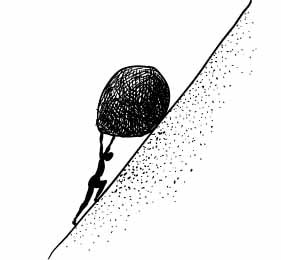 Illustration Ralph Ammer
Illustration Ralph Ammer By Kaz
I HAVE been in the workforce for 32 years, longer if you include the babysitting and cleaning jobs I did as a high school student. Despite two university degrees in education and the arts, most of my professional working life has been shaped by short term contracts, casual employment and small gigs such as running workshops as a sole trader.
There are thousands of workers just like me. Many of us are educated women with considerable professional experience and skills to burn, who have been relegated to a lifetime of under-employment due to industrial changes over the past 35 years. Salaries, permanent and steady work, work with decent conditions underscored by union support are not uniform conditions across the sectors and many workers need to access unemployment benefits to make ends meet, sometimes regularly, often periodically.
It is so glib for politicians and conservatives to say things like “If you have a go, you’ll get a go” while painting a picture of destitute sociopaths sucking on ice pipes and managing money badly. Most of us just don’t have enough ongoing work paid at a rate that enables us to live above the poverty line.
Before obtaining qualifications, I worked in retail, processing, cleaning, food, hospitality and library services. These jobs were contract, part time and casual. Only a few had benefits such as sick leave, overtime or time in lieu attached to them and the casual rates were never fair compensation for workload expectations, the irregular hours and the lack of job security. There is no safety net when work is scarce except unemployment benefits.
I currently have enough work to keep me from having to claim unemployment benefits. I have three jobs to make ends meet. Last year I earned a total of $37,000 across my three jobs which take all my time to manage and all my work is subject to yearly funding considerations so there is no guarantee that I will have any of this good work at the end of 2020. If any of the balls in the air happens to fall, I will be in need of benefits again – any major health issue, natural disaster or economic crash will put me right back in the dole queue.
I worked for a large, reputable university for seven years straight but remained a casual due to a range of industrial relations loopholes. Contrary to popular perception, casual professional staff in the university sector are not well paid. Even if you manage to work a full year you are only actually paid for around eight months of work.
It is easy for politicians to paint generic pictures of the availability of work across Australia. Any view of working conditions for Australians depends on where you are. It is not as easy to relocate as some might surmise, especially if the job you relocate for does not pay particularly well and is in an expensive city. I have relocated many times for employment. It cost me $10,000 to relocate for two years work in Auckland where I earned just enough to pay my rent, bills and food. When I had returned to Australia, I found myself completely broke. The position I returned for had fallen through and I was back on a treadmill of underemployment for another three years.
I should also mention than in my entire working life I have enjoyed only two years where I was able to earn in excess of $55,000 a year and that was in New Zealand. My HECS debt is burdensome and indexed so it only ever gets bigger. People who had the benefit of a free education devised that little gem of economic bondage!
People who have to rely on Newstart for more than six months are insufferably poor, at risk of losing whatever housing and belongings they have and suffer the stress of being ostracised from the local community. The expectation that unemployment recipients should rely on food bank and community services to meet basic needs, and be grateful for it, is unrealistic and derogatory.
I have around $30,000 in superannuation. Even if I applied to access this sum under hardship exemptions, I would lose almost half of it to administration fees.
I don’t feel good about farmers and construction workers in mining and power stations losing their jobs to climate change and changing times, but governments have so far supported them far better than they support everyday people who lose their precarious wage jobs to economic rationalism or illness. Most jobs I have lost simply because they were designed to be short term by people who earn far more than I ever will. There were no pay-outs, support systems, media campaigns, bank loans or authorities funded to ease a transition into a new workplace. I just join the back of the dole queue with all the other joes.
Australians who don’t regularly live beneath the poverty line are good at putting the boot into the joes and insisting that we are living like kings and queens. Frank Hardy wrote about this cultural trait in the mid 1900s when he was discussing the appalling conditions of jobless joes who were eventually required to build the entire country’s infrastructure in exchange for food parcels.
The real story is that there is a diminishing safety net for some Australian people. It’s been chipped away at ever since it was implemented, and I suspect will continue to be dismantled until we are back to susso labour.
Aged 48, Kaz lives in a regional town in Gippsland. She works in the community services and education sector and runs a very small business.
* The writer’s name has been changed as she does not want to jeopardise any of her three jobs.